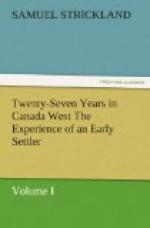Quebec consists of two towns, the Upper and Lower, and is adorned with a cathedral, whose metallic roof glitters in the sun like a vast diamond. Indeed, the tin-roofs of the churches and public buildings give this city a splendid look on a bright sunshiny day, testifying, moreover, to the dryness of the air. Captain Stoddart took me all over this curious city, and kindly introduced me to one of the partners of a great mercantile house, who invited us both to dinner. We regaled ourselves on smelts, fillet of veal, and old English roast beef, to which hospitable meal we did ample justice, not forgetting to pledge our absent friends in bumpers of excellent wine.
The inhabitants of Quebec are very kind to strangers, and are a fine race of people. French is spoken here not, however, very purely, being a patois as old as the time of Henry iv. of France, when this part of Canada was first colonized; but English is generally understood by the mercantile classes.
This city is visited, at intervals, with slight shocks of earthquake.* [* Lyell’s “Elements of Geology.”] Nothing serious has yet followed this periodical phenomenon. But will this visitation be only confined to the mountain range north of Quebec, where the great earthquake that convulsed a portion of the globe in 1663 has left visible marks of its influence, by overturning the sand-stone rocks of a tract extending over three hundred miles?* [* “Encyclopaedia of Geography.”] Quebec contains several nunneries, for the French inhabitants are mostly Roman catholics. The nuns are very useful to emigrants, who have often been bountifully relieved by these charitable vestals, who employ themselves in nursing the sick and feeding the hungry.
The inhabitants—or habitans, as the French Canadians are usually termed—are an amiable, hospitable, simple people, kind in manner, and generous in disposition. The women are lively and agreeable, and as fond of dress in Quebec as in other civilized places. They are pretty in early youth in the Lower Province, but lose their complexions sooner than the English ladies, owing, perhaps, to the rigour of the climate.* However, they possess charms superior to beauty, and seem to retain the affections of their husbands to the last hour of their lives. [* Mac Taggart’s “Three Years’ Residence in Canada.”]
Short as was my stay in Quebec, I could not leave without regret the hospitable city where I had received from strangers such a warm welcome. I have never visited the Lower Province since; but my remembrance of its old capital is still as agreeable as it is distinct. The next day our brig was taken in tow by the fine steam-boat, the “Richelieu de Chambly,” and with a leading wind and tide in our favour we proceeded at a rapid rate up the river.
I shall not attempt to describe the charming scenery of this most beautiful of all rivers, which has already been so amply described by abler writers. I was delighted with everything I saw; but nothing occurred worthy of narration.




